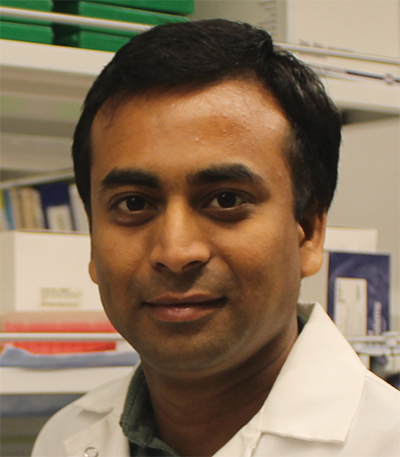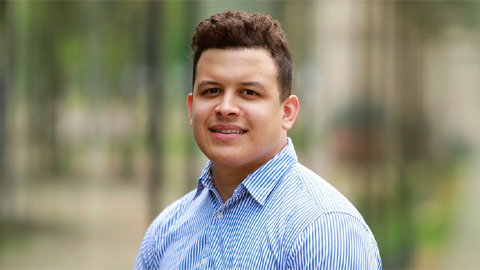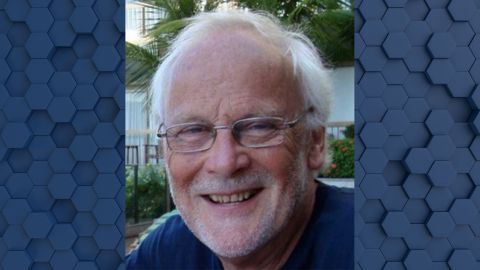Type 1 diabetes work gets special recognition
For the love of science and a drive to understand disease, Vishal Kothari crossed continents and switched his career path from industry to academia.
Kothari grew up in India, where he completed a bachelor’s degree in pharmacy and a master’s degree in pharmacology. He then worked as a research scientist at Advinus Therapeutics Limited (now Eurofins Advinus), playing an important role in identifying drugs with improved efficacy for treating diabetes and cardiovascular diseases. This work provided him with much-needed experience, but given the global reach of diabetes and diabetes-associated cardiovascular diseases, Kothari wanted to investigate cardiovascular diseases at the molecular level as a way to pursue better prevention strategies.
 Vishal Kothari left a career in industry to study cardiovascular diseases at the molecular level.
Vishal Kothari left a career in industry to study cardiovascular diseases at the molecular level.
“Research in the industry is market-driven, but I wanted to do independent research,” he said.
This passion for scientific research spurred his move from his industry position in India to a Ph.D. program in nutritional sciences at Auburn University in Alabama, where his studies centered on mouse models of diet-induced insulin resistance and insulin signaling.
Since earning his Ph.D., Kothari has worked as a senior research fellow in Karin Bornfeldt’s lab at the University of Washington School of Medicine. His work focuses on the effects of changes in the function and composition of high-density lipoproteins in diabetes-associated risk of cardiovascular diseases such as heart attacks.
In addition to research, Kothari also mentors medical and undergraduate students, which he believes will help him to become an independent researcher. When not in the lab, he likes to travel and hang out with friends.
According to Bornfeldt, Kothari is notable for his “enthusiasm for research, his vision and dedication, his excellence in the lab and his team spirit.”
Addressing small HDLs in heart disease
Cardiovascular disease, or CVD, is the most common cause of death around the world. Factors such as hypertension, diabetes or hyperlipidemia increase the risk of heart disorders. According to the American Heart Association, at least 68 percent of people aged 65 or older with diabetes die from some form of heart disease, and 16 percent die of stroke.
High-density lipoprotein, or HDL, is associated with protection against CVD, perhaps in part by reducing inflammatory activation of macrophages, a key cell type in CVD. However, small populations of HDL also can cause cholesterol depletion and produce an inflammatory response by macrophages under certain conditions.
Vishal Kothari’s research is focused on understanding how small HDLs induce such effects and how Type 1 diabetes mellitus, or T1DM, contributes to this effect, since T1DM increases the risk of CVD including heart attacks. His study has shown that depleting cholesterol by HDL increases proinflammatory responses in macrophages both in vitro and in a transgenic mouse model. His findings further demonstrate that higher levels of small HDL populations, as observed in a mouse model of Type 1 diabetes, can exacerbate inflammatory activation of macrophages and that this process is dependent on a protease called ADAM17.
These findings help provide a better understanding of increased CVD risk in Type 1 diabetes and the possible factors mediating such effects.
Enjoy reading ASBMB Today?
Become a member to receive the print edition monthly and the digital edition weekly.
Learn moreGet the latest from ASBMB Today
Enter your email address, and we’ll send you a weekly email with recent articles, interviews and more.
Latest in People
People highlights or most popular articles

Honors for Shan, Landick and Bankston
Awards, promotions, milestones and more. Find out what's going on the lives of ASBMB members.

In memoriam: Ulrich auf dem Keller
A professor at the Technical University of Denmark, he was a leader in wound healing research and mass spectrometry-based proteomics technology.

MOSAIC scholar explores enzymes
Organic chemist Edwin Alfonzo's scientific journey took an unexpected turn when he discovered the world of enzymes.

Honors for Wright, Chiu and Flanegan
Awards, promotions milestones and more. Find out what's going on in the lives of ASBMB members.

In memoriam: Michael Waterfield
He was a British biochemist and a pioneer in the cancer research field who opened a proteomics lab at University College London.

Bakers and mentors help a MOSAIC scholar change her life
Joanna-Lynn Borgogna studies the vaginal microbiome, the metabolome and the development of gynecological disorders in reproductive-aged women.

